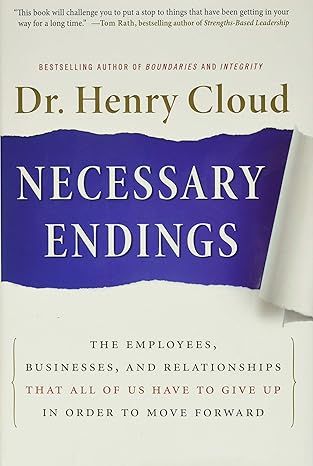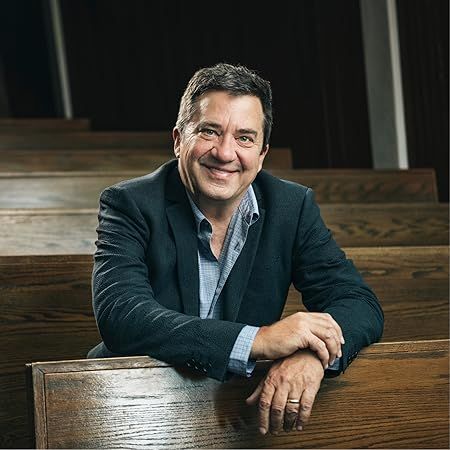Necessary Endings: The Employees, Businesses, and Relationships That All of Us Have to Give Up in Order to Move Forward
4.7 out of 5
2,598 global ratings
“If you’re hesitant to pull the trigger when things obviously aren't working out, Henry Cloud’s Necessary Endings may be the most important book you read all year.” —Dave Ramsey, New York Times bestselling author of The Total Money Makeover
“Cloud is a wise, experienced, and compassionate guide through [life’s] turbulent passages.” —Bob Buford, bestelling author of Halftime and Finishing Well; founder of the Leadership Network
Henry Cloud, the bestselling author of Integrity and The One-Life Solution, offers this mindset-altering method for proactively correcting the bad and the broken in our businesses and our lives. Cloud challenges readers to achieve the personal and professional growth they both desire and deserve—and gives crucial insight on how to make those tough decisions that are standing in the way of a more successful business and, ultimately, a better life.
238 pages,
Kindle
Audiobook
Hardcover
First published January 17, 2011
ISBN 9780061777127
About the authors
Henry Cloud
Dr. Cloud is a New York Times and Wall Street Journal bestselling author, and his books have sold nearly 20 million copies. His leadership book, Integrity, was dubbed by the New York Times as "the best book in the bunch." In 2011, Necessary Endings was called "the most important book you read all year." His book "Boundaries For Leaders" was named by CEO Reads in the top five leadership books of its year. Dr. Cloud's work has been featured and reviewed by the New York Times, Wall Street Journal, Boston Globe, Publisher's Weekly, Los Angeles Times, and many other publications. Success Magazine named Dr. Cloud in the top 25 most influential leaders in personal growth and development, alongside Oprah, Brene Brown, Seth Godin and others. He is a frequent contributor to CNN, Fox News Channel, and other national media outlets.
In his leadership consulting practice, Dr. Cloud works with CEOs, Fortune 500 companies and smaller private businesses alike. He has an extensive executive coaching background, and experience as a leadership consultant, devoting the majority of his time working with CEOs, leadership teams and executives to improving performance, leadership skills, and culture. He also has a specialty in high net worth family offices.
His experience includes three decades as a consultant, and as an entrepreneur he started and grew a successful chain of treatment centers in over 40 cities across the western United States. His experience running a business of this magnitude lends credibility to his expertise on leadership matters in the companies with which he works.As a speaker, Dr. Cloud has shared the stage with many business and global leaders and experts, such as Tony Blair, Jack Welch, Condoleezza Rice, Desmond Tutu, President George Bush, Marcus Buckingham, Magic Johnson, Peyton Manning and many others.Dr. Cloud is a graduate of Southern Methodist University, with a B.S. in psychology. He completed his Ph.D. in clinical psychology at Biola University, and his clinical internship at Los Angeles County Department of Mental Health. His philanthropic interests lie in homelessness in the inner city, as well as missions in the developing world. He lives in Los Angeles with his wife, Tori, and their two daughters, Olivia and Lucy. He enjoys golf, scuba diving, boating and fishing.
Read more
Reviews
Danielle Edens
5
A Must Read
Reviewed in the United States on November 10, 2023
Verified Purchase
This book helped me to evaluate the different areas of my life I was holding onto. Sometimes we hold onto things thinking by Faith God will move upon them when what really needs to happen is to let go of certain things so He can move us forward into the new thing He has for us.
Dr. Henry Cloud gives a great balance of scenarios between the work place and personal relationships and situations. If you’re finding yourself in a season of being stuck this book will definitely be a winner! for you to get unstuck and move forward into the new space and place God has in store for you.
Read more
7 people found this helpful
John W. Pearson
5
The Pruning Moment
Reviewed in the United States on February 7, 2011
Verified Purchase
OK. I admit I'm going out on a limb, but I've already found a contender for my Top-10 book list for 2011. The chapter titles are powerful enough. The actual chapters are pure dynamite. Example: --The Wise, the Foolish, and the Evil: Identifying Which Kinds of People Deserve Your Trust (Chapter 7) --Pruning: Growth Depends on Getting Rid of the Unwanted or Superfluous (Chapter 2) --When Stuck Is the New Normal: The Difference Between Pain with a Purpose and Pain for No Good Reason (Chapter 4) --Sustainability: Taking Inventory of What Is Depleting Your Resources (Chapter 13)
Dr. Henry Cloud, a leadership coach to CEOs and business executives, and a clinical psychologist, has introduced a new term into the leadership lexicon: the pruning moment.
He defines the pruning moment as "that clarity of enlightenment when we become responsible for making the decision to own the vision or not. If we own it, we have to prune. If we don't, we have decided to own the other vision, the one we called average. It is a moment of truth that we encounter almost every day in many, many decisions."
Cloud melds the personal and the professional in this pruning manual of memorable stories and principles and shows why they must go hand-in-hand--and why lack of character on the personal side is often the unseen obstacle to "necessary endings" on the business side.
"Getting to the next level," Cloud writes, "always requires ending something, leaving it behind, and moving on." He takes Peter Drucker's "planned abandonment" and "sloughing off yesterday" themes (see my Results Bucket chapter) and delivers a detailed road map for arriving at your preferred destination.
Necessary endings, he adds, "are the reason you are not married to your prom date nor still working in your first job." Leaders get that, so what's new and fresh? How about his list of the 11 reasons why leaders and managers avoid necessary endings? Here are just four of the preferred avoidance strategies: --"We are afraid of the unknown." --"We do not possess the skills to execute the ending." --"We have had too many and too painful endings in our own personal history, so we avoid another one." --"We do not learn from them, so we repeat the same mistakes over and over."
If your gut says it's time to end a relationship, help an employee exit, dismount a dead horse, say farewell to a sacred cow, or drop a loser program, product or service, this just-in-time pruning book will show you how.
Cloud uses a simple rose bush illustration to explain the pruning process. Pruning is "removing whatever it is in our business or life whose reach is unwanted or superfluous." It's also a process of "proactive endings." He coaches leaders to prune in three categories (think rose bushes):
- Prune healthy buds or branches that are not the best ones.
- Prune sick branches that are not going to get well.
- Prune dead branches that are taking up space needed for the healthy ones to survive. He likes Jack Welch's view that a leader must discern whether a business or a division needs to be fixed, closed or sold.
"All of your precious resources--time, energy, talent, passion, money--should only go to the buds of your life or your business that are the best, are fixable and are indispensable."
"Leaders by nature," Cloud adds, "are often optimistic and hopeful, but if you do not have some criteria by which you distinguish optimism from false hope, you will not get the benefits of pruning. Sometimes the best thing a leader can do is to give up hope in what they are currently trying."
Then, this zinger: "Wise people know when to quit."
And effective leaders know when to ask people to exit. Commenting on Welch's "Neutron Jack" style of pruning the bottom 10 percent of employees each year," Cloud nudges the timid leader with this wisdom: "And I can understand why many people were upset with a fixed strategy like that for firing employees. But I do believe that there is some number of people in every organization and every life who will be routinely `let go' if leadership is doing its stewardship job."
Cloud also delivers fresh ideas in other management buckets, including three practical questions to ask in the Meetings Bucket. If a routine meeting is "sick and not getting well," he offers this example: "We have tried repeatedly to use these times for forecasting, and it just never works. We can't get the information we need as the discussion progresses, and even though we have tried, it is confusing and a waste. Let's stop using this meeting to do that."
I underlined a lot of pages in this book. It's filled with gems...I mean, it's a bouquet of roses that will brighten your day and lengthen your career.
Read more
157 people found this helpful
gigi
5
Great ideas...how to let the unnecessary go...
Reviewed in the United States on June 3, 2024
Verified Purchase
Good book recommended by our pastor...how to let go of the unnecessary in our lives! Just what we needed.
ASH
5
Absolutely awesome-
Reviewed in the United States on June 16, 2023
Verified Purchase
And when I say awesome, I mean something to be in awe of. Full of God-inspired wisdom and written wonderfully to guide through some of the most difficult, but necessary, decisions in life. In a way that is conscientious of the reader’s heartache that may result as they face realities (alone, most likely). Anyway, very grateful for Dr. Cloud’s insight and ability to put truths together. Also very grateful for the timing God allowed me to happen upon this title for my own personal reasons.
Read more
14 people found this helpful
Linda N.
5
Changed my Life
Reviewed in the United States on July 9, 2024
Verified Purchase
I can only speak for myself. Through tears, this book opened my eyes to an entire new world i knew nothing about. It saved my life. Everytime i felt like giving in and staying in a bad place, I picked up this book for a lot of encouragement. It’s repetitive at times and that’s one reason it was so helpful for me. Codependent people need constant reminders to change and make a necessary ending. This did that for me. Such an incredible book and my favorite of all time.
Read more
4 people found this helpful
Liz
5
Great Endings...And Onward
Reviewed in the United States on December 27, 2011
Verified Purchase
I found this book while volunteering at the library. The title caught my attention. Needless to say, it was captivating to read and extremely beneficial.
Dr. Cloud's style of writing flows smoothly and he provides good examples to support or illustrate a concept. As a clinical psychologist, I find it amazing that he is able write to such a wide audience and provide sound practical advice. His ability to communicate his knowledge and insight into human nature is remarkable.
Chapter 7 on wise, foolish and evil people was my favorite. The characteristics of each type of person were easy to remember, keeping the complexity of the problems in dealing with these situations simple. I found this very helpful, so I was able to immediately apply the principles.
Chapter 2 on pruning the rose bush set the stage for the endings that are necessary in our lives in order to grow. I am a gardener and pruning is essential for a beautiful shrub. It is a constant process of evaluation of where to cut and when to do it. The imagery created by Dr. Cloud drove home this point for me.
Overall, I found this book to be excellent for its insights and suggests for making the necessary endings in my life. A burden is lifted and growth takes place. Peace then follows and onward you go to the next level.
Read more
Alicia Crumpton
5
Must read book about endings
Reviewed in the United States on August 29, 2022
Verified Purchase
Cloud, H. (2010). Necessary endings: The employees, businesses, and relationships that all of us have to give up in order to move forward. HarperBusiness.
Dr. Henry Cloud spent much of his career paying attention to to leadership performance and development, blending the disciplines of leadership and human functioning to helping CEO’s, teams, and organizations. Dr. Cloud holds a BS in psychology from Southern Methodist University, a PhD in clinical psychology from Biola University, and did a clinical internship at Los Angeles County Department of Mental Health.
He acknowledges that endings are a part of organizations and life. Yet, people resist ending things experiencing sadness, hesitation, procrastination, and regret at the need to make a decision. While endings are necessary, they are often delayed or avoided. I'm one of those people who dislike saying goodbye, stay at a party far longer than I want, and stay in situations far past my longing to stay. He provides a number of explanations for why we avoid ending creating a rich space within which to reflectively consider endings and one's orientation towards them. Some quotes:
"Learning how to do an ending well and how to metabolize the experience allows us to move beyond patterns of behavior that may have tripped us up in the past. We do not have to keep repeating the same patterns. "
"If you see an ending as meaning "something is wrong if this has to happen," you will resist them or fight them long past when they should be fought. Endings have to be perceived as a normal part of work and life. "
Cloud uses the metaphor of pruning to illustrate why endings are sometimes necessary. Not all is meant to survive or to be prolonged but instead a good pruning creates an opportunity for newness to be facilitated. This is a super book for people needing to change or end something, organizational leaders, and organizational change consultants.
Read more
19 people found this helpful
Becky Blanton
5
You're Not a Leader if You Haven't Mastered These Principles
Reviewed in the United States on April 17, 2011
Verified Purchase
I used to think "
354 people found this helpful
Ian Mann
4
Pruning applies to big issues like ending relationships with people and projects
Reviewed in the United States on April 11, 2017
Verified Purchase
We have a finite amount of energy, time and money available. What is spent on the wrong things cannot be spent on the right ones. Gardeners get this: They understand the need to remove diseased, overmature, or unwanted portions from the rose bush. They know that pruning encourages denser growth and more profuse flowering by concentrating the plant's energy on continued flower production. Part of the lifecycle of plants is the need for pruning. Part of the lifecycle of people and organizations is the need for pruning. Pruning applies to big issues like ending relationships with people and projects, and small ones like scrapping parts of the Monday morning meeting agenda that no longer add value. More important issues cannot be added to the time tight agenda unless other items are removed. Clouds’ book, Necessary Endings, is a guide to ending relationships that are no longer working, investments that are not performing, so we can use the finite amounts of time, energy and money that we have for what can work. To do that effectively we need to be clear what we are dealing with so we do not end what we should persevere with and not persevere with what we should end. A useful rule of thumb is his distinction between “hoping” and “wishing.” Hoping is when the expectation of an improvement in staff productivity or an investment returns is based on sound evidence or reasoning. In contrast, wishing is the baseless expectation of improvement of the situation. Jack Welch was a legendary pruner. He pruned any companies that were not number one or number two in their industries or on their way to becoming number one or number two. He instructed his managers to spoil the top 20% of their staff, take care for “solid” 70% and fire the bottom 10%. Both the business and the staff were stronger for this as evidenced by GE’s spectacular results during his twenty year tenure as Chairman and CEO. Cost cutting should not be confused with pruning. Pruning is strategic, cost cutting often results in fewer people required to do more with less, hardly a clever strategic move. Cloud, a clinical psychologist, explores the many emotional traps that prevent us from ending what is necessary. They range from the mistaken belief that “winners don’t quit and quitters don’t win” to the feeling that “we may be in hell, but at least we know every street.” Even when there is no longer any reason to believe that the project, employee, relationship or partnership will ever come right people decline to effect the necessary ending. This feels preferable to being labeled the “bad guy” by oneself or others. There are books for gardeners on how to prune the roses. Executed competently, you get great blooms and done purely or not at all, you will have ungainly, leggy growth with bare branches at the base. Necessary Endings is probably the business equivalent. The good times can not start until the bad times end.
Readability Light --+-- Serious Insights High -+--- Low Practical High +---- Low
Ian Mann of Gateways consults internationally on leadership and strategy
Read more
91 people found this helpful
Joshua Reich
4
A Book Every Pastor Should Read
Reviewed in the United States on September 3, 2013
Verified Purchase
As the title indicates, the book is about how to know when things have run their course. It looks at how life, business, church, relationships and organizations all have a life cycle. We all know this. We aren't friends with everyone forever, we don't have ministries that run forever (although it might feel that way at some churches), we don't have products that last forever. Things end. People move on. Sometimes that ending is hurtful and sometimes productive. But they happen.
What Cloud does and it is something every leader needs to learn is how to know when that ending is happening (before it's too late) and how to end it and move on in a healthy way.
For the longest time I've been terrible at this. I hold onto relationships too long. I let people who hurt me stay in my head for years. While I've grown in this area, I'm nowhere close to where I need to be, which is why I found this book so helpful.
Here are a few things I highlighted:
-For there to be anything new, old things always have to end, and we have to let go of them. -Getting to the next level always requires ending something, leaving it behind, and moving on. Growth itself demands that we move on. Without the ability to end things, people stay stuck, never becoming who they are meant to be, never accomplishing all that their talents and abilities should afford them. -In many contexts, until we let go of what is not good, we will never find something that is good. The lesson: good cannot begin until bad ends. -Often, there are no good business reasons for waiting to do something that should be done now. -In the simple word pruning is the central theme of what a necessary ending is all about: Removing whatever it is in our business or life whose reach is unwanted or superfluous. the question is more about this: are you only achieving average results in relation to where you or your business or team is supposed to be? In other words, given your abilities, resources, opportunities, etc., are you reaching your full potential, or are you drifting toward a middle that is lower than where you should be if you were getting the most from who you are and what you have? -Make the endings a normal occurrence and a normal part of business and life, instead of seeing it as a problem. -One of the most important aspects to any high performance is the ability to separate one's personhood from any particular result. the great leaders make "life and death decisions," which, as he pointed out, were usually about people. Those are the decisions that cause big directional changes in businesses, where the life or death of the vision depends on someone stepping up and acting. -What is not working is not going to magically begin working -If you comb the leadership literature, one theme runs throughout everyone's descriptions of the best leaders. The great ones have either a natural ability, or an acquired one, as Collins says, to "confront the brutal facts." -In the absence of real, objective reasons to think that more time is going to help, it is probably time for some type of necessary ending. -When truth presents itself, the wise person sees the light, takes it in, and makes adjustments. -People resist change that they feel no real need to make. -In my experience with businesses and individuals, not paying attention to sustainability is one of the most common reasons that they get into trouble, sometimes unrecoverable trouble.
As a leader, this is a book worth picking up. I think for many pastors, knowing when to end a ministry, a relationship or how to handle a leader who is not performing, this book can be extremely helpful.
Read more
12 people found this helpful
Top Henry Cloud titles
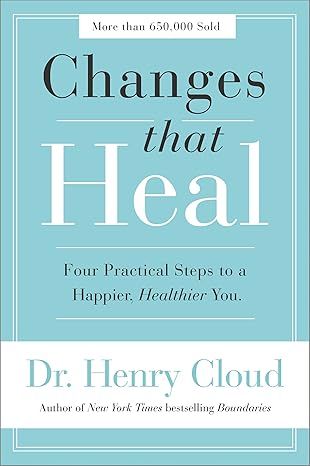
Changes That Heal: Four Practical Steps to a Happier, Healthier You
4.8
-
2,937
$0.99
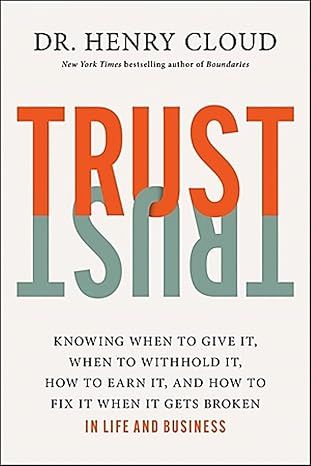
Trust: Knowing When to Give It, When to Withhold It, How to Earn It, and How to Fix It When It Gets Broken
4.8
-
626
$0.99
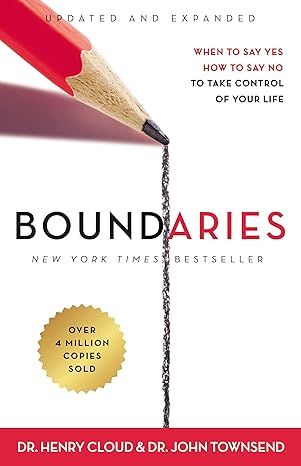
Boundaries Updated and Expanded Edition: When to Say Yes, How to Say No To Take Control of Your Life
4.7
-
23,877
$0.99
Best Sellers

The Tuscan Child
4.2
-
100,022
$8.39

The Thursday Murder Club: A Novel (A Thursday Murder Club Mystery)
4.3
-
155,575
$6.33

Sapiens: A Brief History of Humankind
4.6
-
140,302
$13.49

The Butterfly Garden (The Collector, 1)
4.3
-
88,556
$9.59

Things We Hide from the Light (Knockemout Series, 2)
4.4
-
94,890
$11.66

The Last Thing He Told Me: A Novel
4.3
-
154,085
$2.99

The Perfect Marriage: A Completely Gripping Psychological Suspense
4.3
-
143,196
$9.47

The Coworker
4.1
-
80,003
$13.48

First Lie Wins: A Novel (Random House Large Print)
4.3
-
54,062
$14.99

Mile High (Windy City Series Book 1)
4.4
-
59,745
$16.19

Layla
4.2
-
107,613
$8.99

The Locked Door
4.4
-
94,673
$8.53
